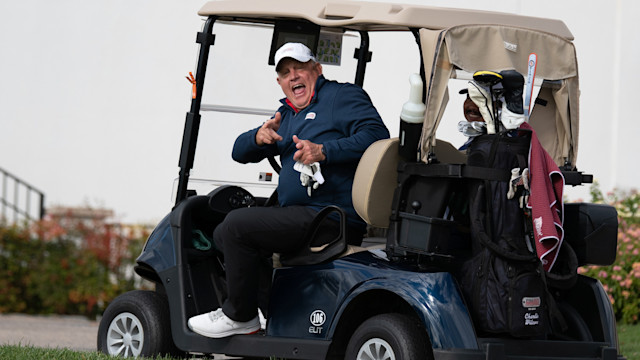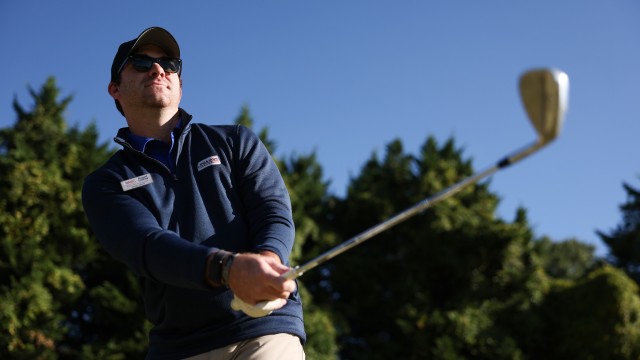Game Changers
How Golf, PGA HOPE 'Totally Changed' the Life of Army Veteran Jayme Turner
By Jay Coffin
Published on

There are open books, and then there is Jayme Turner.
The retired Army Combat Medic is a refreshing storyteller who is willing to answer every question in as much detail as necessary.
“If me being straight up and brutally honest telling the world what I’ve been through, if it helps people understand that they’re not in uncommon situations … ” Turner said. “If I can go through that and still have hope in my life, it can work for other people. It’s important for people to know the truth.”
Turner, 47, is a PGA HOPE Ambassador who represents the Utah PGA Section. He begins this conversation talking about his background, where he grew up and how he ended up in the military, which resulted in three combat tours in Iraq. All of it wildly fascinating.
He was born in Durham, North Carolina, but his family moved to Kotzebue, Alaska, a small Eskimo village where he often would be tied by rope with other students and walked to elementary school through blizzards. During his time there he almost died of hypothermia while riding on a dogsled with his father.
Turner’s parents divorced when he was 9 and his mother, who was in the Army National Guard, raised five children on her own. They moved around a lot—Washington, Arizona and finally landed in Utah where he lived from ages 13 to 19.
Admittedly, Turner was socially awkward in high school. His grades were terrific, he was in the National Honor Society, but he was shy. So he applied to become the jaguar mascot at West Jordan High School. He got the job and donned the massive jaguar head and oversized feet.
“I invested my senior year how to be social and developing that aspect of my personality,” Turner said. “I enjoyed it.”
In 1997, young love prompted Turner to join the Navy out of high school, he felt that was the best way to provide for his new bride and child that was on the way. He moved to Bremerton, Washington, was stationed aboard the USS Carl Vinson and became an Aviation Ordnanceman, where his assignment was to build bombs for jets.
Soon after, Turner did a WestPac tour, where he was in Australia, Singapore and Hong Kong, among other places. He spent six months serving in Operation Desert Fox in 1998 and was in the Persian Gulf that year when his son Justis was born.
“I had a young marriage, the deployment was really difficult on it and we didn’t end up staying together,” Turner said. “We just didn’t know how to be in a mature relationship where you’re developed emotionally and know all the things you need to know. It’s tough.”
Turner did not reenlist after three years, the ship life was not for him. He moved back to Utah to be around Justis and attended the Utah College of Massage Therapy, where he was in class on September 11, 2001, a day he was not able to forget.
A few months later Turner was part of a team that gave sports massages to Olympic athletes in the Olympic Village during the 2002 Winter Games in Salt Lake City. He was trying to make his first marriage work, his daughter Jordan was born in 2003 but he just could not pull himself away from war coverage on television.
“I felt called to go back,” Turner said. “I wanted to help save lives. I wanted to be a medic.”
That was the start of a 10-year Navy career.
In November 2004, Turner was deployed to Iraq for the first time with the 4th Infantry Division. He described it as the most difficult of his three deployments. He medevacked more soldiers than he could count, he was on a rooftop when a rocket-propelled grenade (RPG) flew over his head, he was traveling in a Humvee when a mortar landed on the hood. Thankfully it did not explode.
“I’m not very religious, but there were times when I shouldn’t be here,” Turner said. “I was doing important work.”
Most of the second deployment was spent training Iraqi soldiers. He was diagnosed with complex post-traumatic stress disorder just as he left for his third deployment, which came in 2011. He served in medical operations.
During that tour he earned the Capt. John R. Teal Leadership Award for exemplifying outstanding leadership skills, something he was humbled by and calls “validation” for his efforts to that point. But the PTSD was becoming an issue and he was more abrupt than he had ever been. “I was salty,” he said. “I didn’t have patience with anybody.”
Turner admitted that he was drinking too much. He could function during the day, never had an incident, but he would essentially drink himself to sleep each night. By the time he returned from that deployment, he was suicidal. When he went to seek help, he was essentially faced with a choice between staying in the military or leaving to work on his mental health. He retired.
Turner got married again between his second and third deployment but that was falling apart. He moved to Utah to be closer to his two children.
“Recovery from everything took quite a few years,” he said. “I couldn’t go to a store. I couldn’t drive in traffic. I had to change times when I went to certain locations, and there were certain locations that I just couldn’t go to. I stayed in my house a lot. I was isolated. It took a long time for me to be close to functional.”
Turner was introduced to golf 13 years ago when a friend sold him a set of clubs. They had a blast together, but it was a short-lived stint with the game.
Three years ago, Turner was at the Veterans Affairs clinic in St. George, Utah – where he’s an Intermediate Care Technician (ICT) – and he saw a flier about the PGA HOPE program at Southgate Golf Course. He was asked to recruit Veterans to attend. But Turner didn’t feel right about asking Veterans to do something that he hadn’t done himself.
“I picked my clubs back up again,” Turner said. “After I went through it, it was the first time in a decade that I felt alive. I didn’t have any hobbies. I didn’t want to be social. I was isolated for pretty much a decade.
“PGA HOPE totally changed my life.”
Two years after that initial meeting, Turner represented the Utah PGA Section as one of 20 Ambassadors last fall at National Golf and Wellness Week in Washington, D.C.
“He really cares about Veterans and how he can help them,” said Rob Krieger, lead instructor for PGA HOPE St. George. “We’re really fortunate that he’s taking this seriously. I have the highest regard for him, who he is as a person, what he’s had to go through from being in the military and how he’s continuing to still serve Veterans who are just like him.”
Chris Cordova was the leader of the Cold Blood squad, which Turner was on during the week in Washington, which included competition at Congressional Country Club. Cordova vividly recalls watching Turner’s growth during that important week and says that he remains a valued leader now, more than six months later.
“He’s been the one to revive the text group, just to stay in touch with everyone,” Cordova said. “He’s always asking how everyone is doing.
“He’s motivated to share his experiences with other Veterans. I could see it that week and it’s been like that since that week has come and gone.”
Turner cares about Veterans more than just on the golf course too. Aside from his ICT role, Turner is spearheading a national pilot program in Utah, called SCOUTS – supporting community outpatient urgent care telehealth services. He goes into the community and assists Veterans age 65 and older with telehealth visits with their physicians, helps with physical assessments and anything that needs to be done following a surgery or hospital visit.
In his spare time, and there isn’t much, Turner plays as much golf as he can – he’s down to a 13 handicap – and is even taking classes to earn an associate degree in golf business management. He doesn’t know where that will lead, but he loves the game so much, and is still a relative newbie.
“I didn’t go to school with the hope of leveraging it into a career,” he said. “How do I want to spend the next 20 years? I want to spend it on the golf course. I might as well go to school for it and learn more about it.”
Turner is now married for a third time. “This one is going to stick,” he says proudly of Carolyn, who works in the mental health field. Son Justis is in North Carolina and is an engine mechanic in the Air Force. Daughter Jordan lives in Georgia.
Life is good when it wasn’t not all that long ago.
“The best thing you can do for a Veteran is give them a mission and let them execute,” Turner said. “You get out, you lose your culture, you lose your community, you lose your identity. I used to be Sgt. 1st Class Turner. I was in charge. Then I come out and I’m just Jayme. I’m not a soldier anymore. You go through this long process of searching for yourself.
“Through the PGA HOPE program and the pilot program I found a new mission and I still ride in line with who I am as a person in continuing to care for our nation’s Veterans. The value of that bond, that is deeper than deep.”


